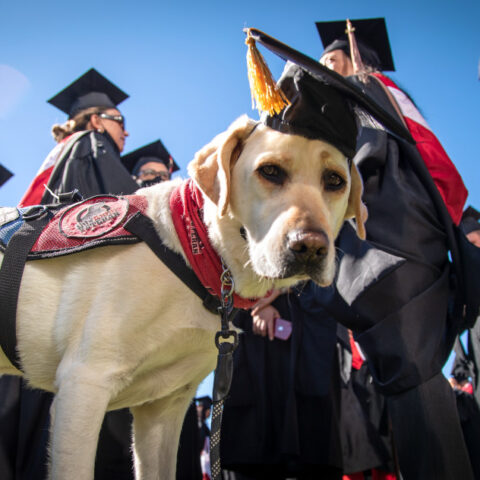6.1 Instruction
Syllabi serve as a formal communication tool, covering essential course elements such as modality, learning objectives, materials, expectations, policies, and student support services. The New York State Education Department and the Center for Teaching Innovation offer best practices for creating effective syllabi. Instructors are encouraged to attach their syllabi to the Cornell Class Roster, even in draft form, to provide students with the prospective course experience and make informed registration decisions. Additionally, the university-wide Cornell Academic Materials Program (CAMP) provides undergraduates with access to required textbooks and coursepacks for a flat fee, regardless of their field of study.
The university bylaws define the academic year as a roughly nine-month period, starting two working days before fall term registration and ending with final examinations in the spring term. Summer spans from the last day of one academic year to the first day of the subsequent academic year. Faculty members, regardless of appointment length, are expected to be present throughout the academic year, except for leaves of absence, holidays, and professional travel. Faculty members must remain on campus until they submit grades for spring term courses. The provost, in consultation with the Student Assembly and Faculty Senate, determines the academic calendar details, occasionally introducing small variations announced in advance to the university community.
The Office of the University Registrar oversees the Courses of Study catalog, which lists the current standard class meeting patterns. Class meeting patterns are listed by duration and the number of times the class meets per week: 50 Minutes, 75 Minutes, 115 Minutes, 150 Minutes, and 180 minutes.
Offering a course during a nonstandard meeting time requires approval (see Exceptions guidance below) if the course is numbered 4999 or less or it is cross-listed with a course that is numbered 4999 or less or co-meets with a course that is numbered 4999 or less. Approval is also required for Law School, Johnson Graduate School of Management, or Veterinary College classes numbered 5000 or above that meet between 7:30 am and 4:25 pm in buildings that are not part of their space. The granting of exceptions partly depends upon the specific type of class and the credit hour policy.
Instructors must work with their unit chairperson to make every effort within the academic unit to comply with the above standard class meeting times. Only when local resolution proves impossible may the faculty member request, in writing, an exception. The exception request must first be approved by the unit associate dean, or an equivalent individual designated by the unit dean, who must then seek final approval from the vice provost for undergraduate education.
The ‘free-time zone’ is a designated time that provides a reliable time for relaxation and extracurricular activities. According to faculty legislation, the free-time zone spans Mondays through Thursdays from 4:25pm to 7:30pm, Fridays after 4:25pm, Saturdays after 12:05pm, and all-day Sunday. It is important that the intent of the free-time-zone policy be respected during the process of course scheduling. For that reason, the scope of teaching in the free-time zone will be reviewed annually by the Vice-Provost for Undergraduate Education, the Dean of Faculty, and the University Registrar.
Courses numbered 4999 or lower are considered ‘undergraduate-level,’ even if cross-listed with higher-numbered courses. All other courses fall under the ‘graduate-level’ category. Graduate-level courses can meet during the free-time zone unless they are cross-listed with or co-meet with undergraduate-level courses.
Student Attendance Responsibility
Students are expected to attend all course meetings throughout the term. While some courses enforce penalties for absences, others focus on students’ responsibility for class material rather than physical presence. Attendance rules are set by the unit or the instructor In cases of missed work, cooperation with the instructor is essential for makeup opportunities because only the course instructor can grant an exemption to a student. However, it may be particularly challenging to make up missed work for tests, laboratory sessions, or field trips, as the instructor’s discretion plays a significant role.
Instructor Attendance Responsibility
Academic employees bear essential responsibilities, including teaching, advising, and research mentorship, and scholarship. In cases of unforeseen absence (due to illness, transportation issues, or emergencies), course instructors should arrange for substitutes or inform students and others dependent on their presence. For planned absences, provisions must be made to fulfill academic obligations, with communication to affected parties. When makeup classes are scheduled outside regular hours, instructors should consider potential conflicts for students. If, in attempting to avoid such conflicts, the instructor arranges to have the class taken by a substitute, that person must maintain continuity and coherence in their presentations as well as the level of presentation provided by the regular instructor. For these and other reasons, the missing of classes should be held to a minimum, and assignments of makeup classes and coaching of a substitute should be done with care. Having such plans approved by the unit chairperson is advised.
In 2023, the Faculty Senate enacted a policy prohibiting faculty from assigning graded academic coursework during scheduled breaks. Consequently, faculty cannot administer graded exams or quizzes, conduct in-class graded assignments, or set due dates for graded assignments immediately after a break. This measure aims to reduce the demand on students’ time during their breaks.
If a course is offered for credit, then the instructor of record is the individual who assigns the final course grade. The instructor of record must be an academic titleholder if the course is numbered 4999 or lower.
An individual who is not an academic titleholder can serve as the instructor of record if the course is numbered 5000 or higher and is not a requirement for any degree program affiliated with the sponsoring unit. Co-teaching with an academic titleholder is always allowed provided the academic titleholder serves as the instructor of record.
No member of the instructional staff, including assistants, may engage for profit or gain in tutoring a student in a university course taught by himself or herself or by colleagues in the same unit. University buildings or equipment are not to be used by any member of the instructional staff for tutoring for profit.
Cornell University places a strong emphasis on academic integrity, expecting unwavering honesty from its students. It is a shared responsibility where both students and faculty play a role in maintaining these values. Whether in formal coursework or any other educational context, students must: acknowledge any outside assistance received for all academic endeavors; respect the intellectual efforts of themselves and others, which is undermined by plagiarism and cheating; respect the fact that academic integrity extends beyond the classroom to all interactions related to the educational process. By submitting work for academic credit, students truthfully affirm that it is their own.
Plagiarism-detection software, like Turnitin, is activated by default in all Canvas courses. It scans student submissions for matched text by comparing the work to a large database of other student submissions, publications, and materials on the internet. Instructors who use or anticipate using plagiarism-detection software must provide notice to students. This notice should be included in the course syllabus. If plagiarism-detection software is instituted after the syllabus is distributed, faculty should provide written notice at that time. For example:
“Students agree that by taking this course, all required papers may be subject to submission for textual similarity review to plagiarism-detection software. All submitted papers will be submitted as source documents solely for the purpose of detecting plagiarism of such papers. Use of such services is subject to their Usage Policy.”
The course instructor has the authority to decide the technology use policy, which should be included in the syllabus and communicate it to students on the first day of class. However, accommodations must be provided for students with disabilities.
Some students buy and sell course materials online, including exams and exam answers, lecture notes, problem sets and answers, and student papers. Commercial vendors have been known to falsely tell students that instructors have approved the sale of course materials and then post them online for resale. Some Cornell students have engaged in ‘contract cheating,’ subscribing to study sites like Chegg, CourseHero, and Slader to obtain answers for exams and assignments and then submitted them as their own work. Such behavior constitutes “Unauthorized Assistance” under the Code of Academic Integrity.
Online learning management systems, like Blackboard and Canvas, emphasize that course materials posted there are intellectual property belonging to the author, and students are not allowed to buy or sell them without the instructor’s express permission. To discourage such behavior, course instructors are encouraged to explicitly prohibit buying and selling course materials in their syllabi. Additionally, including a copyright notice on any course materials that you author, including class notes and exams, helps protect against unauthorized distribution. If students were to remove a copyright notice, that behavior would create a higher level of culpability. Such a notice would also make it easier for you to take down materials from commercial sites. Under the Digital Millennium Copyright Act (DMCA), to have materials removed from a web site, the copyright holder must personally request the removal. Although student-produced course materials, like lecture notes, are owned by the student, course instructors can still set conditions on their use. For instance, they may prohibit distributing notes derived from their lectures on internet sites, such as recommended above. Original course materials are copyrighted intellectual property of the creator of the content and are not a student’s property to share, distribute, or sell; sharing or selling course materials or lecture content, even a student’s own class notes, without authorization, is subject to a charge of “Classroom Misconduct” and possibly copyright infringement.
Instructions on how to locate and request removal of copyrighted course materials sold on Internet sites.
Instructors play a crucial role in ensuring equal opportunities for students with disabilities. Under Federal law, disabilities such as learning disabilities, certain physical and mental health conditions, vision and hearing impairments, and traumatic brain injuries qualify for accommodations. Students with documented needs are entitled to appropriate access accommodations. Student Disability Services collaborates closely with students to determine eligibility and provide necessary accommodations for each course. Faculty should provide the accommodations specified in the accommodation notification letter prepared by Student Disability Services. Student Disability Services also supports faculty. Instructors should promptly discuss modifications with Student Disability Services if an approved accommodation would significantly alter the course’s structure or essential requirements. Additional accommodation resources are provided by other entities on campus, such as the center for teaching innovation, Cornell Office of Civil Rights, student campus life, and the student-athlete handbook.
Role of Student Disability Services
- Review disability documentation, determines eligibility, and ensures equal opportunity.
- Collaborate with students and instructors to address unique course accommodations.
- Provide adaptive equipment, exam laptops, lab assistants, and other necessary support.
Key Points for Students
- Self-identify to Student Disability Services.
- Provide disability documentation.
- Student Disability Services issues accommodation notification letters to registered students.
- Notify faculty promptly to facilitate necessary arrangements.
- Discuss specific needs with instructors.
Role of Faculty Maintaining Confidentiality
- Students’ disability status is confidential.
- Instructors may share accommodation information with academic support staff.
- Disability documentation is maintained by SDS and reviewed only by SDS staff.
Key Points for Instructors
- Create an Open Climate – Encourage students to communicate their needs. Use the first week of class or the syllabus to express appreciation for the accommodation process. Remember that new students may feel hesitant to request accommodations.
- Timely Requests – Emphasize that accommodation requests should be submitted promptly to allow for logistical planning.
- Avoid Last-Minute Requests – Clearly state that last-minute accommodation requests made are problematic due to procrastination.
- Timeliness Matters – Instructors should act promptly to accommodate students, as delays could impact a student’s ability to remain in the course.
- Confidentiality – Ensure that students can submit accommodation requests confidentially.
- Consistent Accommodations – If the same accommodation applies throughout the term, set this up from the start to avoid reminders.
- Flexible Arrangements – While two weeks’ notice is reasonable, faculty should accommodate requests with shorter notice if possible.
- Episodic Health Conditions – Some students with episodic health conditions may need flexibility (e.g., makeup exams) due to unexpected episodes.
- Syllabus Statement – Instructors are encouraged to include an accommodation statement in the syllabus, informing students of their rights and minimizing last-minute accommodation requests.
Sample language for accommodations syllabus statement: If you have a disability-related need for reasonable academic adjustments in this course, provide the (Instructor, TA, Course Coordinator) with an accommodation letter from Student Disability Services. Students are expected to give two weeks’ notice of the need for accommodations. If you need immediate accommodations, please arrange to meet with your (Instructor, TA, Course Coordinator) within the first two class meetings. Students have the right to confidentiality of their disability status. Instructors may share accommodation information with academic support staff for the purpose of the provision of accommodations. Instructors should refrain from making any disability related comments in front of the class or in presence of other students, faculty or staff who are not directly involved in the accommodation process. Disability documentation in maintained in the SDS office and should only be reviewed by the Student Disability Services staff.
Harassment, Discrimination, Bias Reporting
Through Cornell University Policy 6.4, the university provides means to address bias, discrimination, harassment, and sexual and related misconduct, including gender-based harassment, sexual harassment, sexual assault, domestic and dating violence, stalking, and sexual exploitation. In accordance with federal and state law, Cornell offers a range of resources, support services, and measures to protect the safety and well-being members of the community and to promote an accessible educational environment. Some such measures are measures, which may include academic accommodations or no-contact orders and may be issued based upon a party’s request or at the University’s own initiative. In all instances, the University will, at its discretion, determine whether any given Interim Measure is reasonable and appropriate. Typically the Title IX Office works with the associate dean of the school, who will then work with the faculty member, when an accommodation pursuant to Policy 6.4 is requested.
Cornell Health does not provide excuses for routine illnesses, injuries, and mental health problems that may lead to missed classes, labs, studios, exams, or deadline. This longstanding policy resembles those of most other major universities and is consistent with the recommendations of the American College Health Association. The University expects students to be honest with their professors regarding their ability to complete work and that they communicate any accommodations request in a timely fashion. Professors are expected to work with students on these issues. Academic advising staff and associate deans are available to provide assistance to students or faculty members who have concerns about attendance issues.
Instructional staff are required by New York State law to accommodate students when religious observance conflicts with exam-taking, class attendance, and other course-related requirements:
“3. It shall be the responsibility of the faculty and of the administrative officials of each institution of higher education to make available to each student who is absent from school, because of his or her religious beliefs, an equivalent opportunity to . . . make up any examination, study or work requirements which he or she may have missed because of such absence on any particular day or days.
“4. If . . . classes, examinations, study or work requirements are held on Friday after four o’clock post meridian or on Saturday, similar or makeup classes, examinations, study or work requirements . . . shall be made available on other days, where it is possible and practicable to do so. . . .”
The Office of Spirituality and Meaning Making maintains a comprehensive accommodation website that is an extremely valuable resource for both students and faculty. Many students are unaware that steps can be taken so that they can be committed to both their faith and their studies. Some are aware but hesitant to seek an accommodation because they fear retribution once their faith is revealed. These realities make it all the more important to communicate accommodation mechanisms early in the term, preferably via a published syllabus. The sensitive handling of a religious-observance accommodation sends a positive message to the student because it reaffirms Cornell’s commitment to diversity of thought. This calendar of religious holidays should be consulted before scheduling due dates and exams.
At Cornell University, varsity athletics are an integral part of the undergraduate educational experience. Instructors are encouraged to recognize the value of learning that occurs outside the classroom through athletic participation. When conflicts arise between student-athletes’ athletic schedules and course requirements, instructors are expected to find ways to accommodate them. Student-athletes are responsible for notifying their instructors in advance of any class days they will miss due to university-approved athletic events. The Ivy League holds student-athletes to high standards, overseen by the Faculty Committee on Athletics and Physical Education (FACAPE) and outlined in the Student-Athlete Handbook. FACAPE approves each team’s competition schedule to minimize absences. Unforeseen changes are communicated by the Department of Athletics & Physical Education. The FACAPE Missed Class Time Policy helps assure that athletic obligations are kept in appropriate context with academic standards and expectations of our institution. Ultimately, it is the responsibility of varsity athletes to arrange makeup assignments or requirements with their instructors. Instructors who have concerns about a particular varsity-athlete accommodation request should contact the FACAPE Chair or the Dean of Faculty.
Reservists and active-duty students may be called away to complete mandatory military service for varying lengths of time. In such cases Federal and State Law requires that steps be taken to ensure readmission to the student’s educational program. The instructor should work with the student and others to ensure that the return to school is as smooth as possible.
When a student is hospitalized or has a serious, ongoing illness or injury, and with the student’s consent, Cornell Health will contact Cornell’s Crisis Manager to coordinate communication with the student’s college. If the student, with their medical or mental health clinician, believes that providing information about a significant, ongoing health problem (not a short-term illness) could facilitate appropriate academic accommodations, Cornell Health will, at the student’s request and with the student’s permission, communicate with the college’s academic advising office and/or Student Disability Services.
Other types of accommodation requests are approved at the discretion of the instructor. Overall fairness, educational value, and responsibilities to family are among the factors that can be taken into account. In a timely fashion, students are expected to provide enough detail about their request for an accommodation so that the instructor can make an informed and respectful decision.
In May 1965, the University Faculty adopted the Cornell University Grading System . The official University grading system is composed of letter grades with pluses and minuses. Passing grades range from A+ to D–; F is failing. INC denotes a grade of incomplete, NG denotes a non-graded course, NGR signifies no grade reported, and R is the grade given a for an in-progress multi-semester course.
Letter grade values are combined with course credit hours to produce an average based on a 4.3 scale. Grade point average is calculated by multiplying the credit hour and quality point equivalent for each course and then dividing by the total number of credits taken. The cumulative average is the sum of the products of all the grades at Cornell divided by the total number of credits taken.
Alongside the letter grade system stands an SU System, in which S means satisfactory, as defined by performance that would be graded C- or higher, and U means unsatisfactory, as defined by performance that would be graded below C-. Grades of S and U are not given grade point values or taken into account in computing grade point averages. The purpose of the S‐U System is to encourage students to venture into courses outside their main areas of familiarity without great risk to their academic record. Credits toward the fulfillment of graduation requirements are earned for courses evaluated S but not for those graded U. The various schools and colleges differ in the restrictions they place on the election of S/U grading over letter grading. But where college rules and course procedures allow it, the election is a student option that must be exercised within the drop period for the course. Students may not defer the decision in the hope of first seeing the letter grade they are likely to earn.
The symbol of Incomplete is only appropriate when two basic conditions are met: (1) The student has substantial equity at a passing level in the course with respect to work completed; and (2) the student has been prevented by circumstances beyond a student’s control, such as illness or family emergency, from completing all of the course requirements on time.
An Incomplete may not be given merely because a student fails to complete all course requirements on time. Such a practice would be open to abuse; by deferring completion of some major course requirement, a student could gain advantage over his or her classmates by obtaining additional time to do a superior job. This is not an option that may be elected at the student’s own discretion.
While it is the student’s responsibility to initiate a request for an Incomplete, reasons for requesting an Incomplete must be acceptable to the instructor, who establishes specific makeup requirements. An Incomplete allows a specified amount of time determined by the student’s college of registry, for completing course work. The instructor has the option of setting a shorter time limit than that allowed by the student’s college. Instructors under no circumstances should give an Incomplete due to pressure to meet the deadline for reporting grades.
Several colleges require that a statement signed by the instructor be on file indicating the reason for the Incomplete and the restriction, if any. The consequences of failure to complete all course work within the time permitted will depend upon the policy of the students college of registry. Some colleges convert the Incomplete symbol to a grade of F; others let the Incomplete stand on the student’s transcript. In either case, the option to make up the work is lost. It is the responsibility of the student to see that all Incompletes are made up within the deadline and that the grade change has been properly recorded with the student’s college registrar.
Late grades should be avoided. They often result in unwarranted academic actions or even in students not being able to graduate on time.
Posting of student grades by name or a personally identifiable number is prohibited under the terms of the Family Educational Rights and Privacy Act of 1974 (FERPA). However, a student waiver authorizing disclosure of educational records by means of a personally identifiable number (e.g. a student ID number) is acceptable provided that such consent is in writing, dated and signed by the student.
[NOTE: A name or social security number must never be used for this purpose.] If instructors use this method, the waiver must be for a specific course; must be for a specified period of time (semester, academic year, etc.); must specify the records to be disclosed; and must be retained by the instructor of the course for a period of one year after its expiration. Students should not be coerced into signing a waiver, as the law requires that it be voluntarily given. Instructors may post grades for students who do not want their student ID number used by establishing a unique identifier known only to that student and the instructor.
Each semester’s work is an entity and grades are to be assigned for work completed during the normal period of the semester. As a matter of equity, grades must not be changed after the end of a semester because a student may have subsequently done additional work.
Only the instructor of the course has the responsibility and authority to judge the quality of a students work and assess the appropriate letter grade. No one can overrule instructors and require them to go against their judgment of the work.
A grade must not be arbitrary or capricious or influenced by illegal discriminatory considerations. It must not contain a punitive element for an offense against academic integrity if the student has been found innocent by a duly constituted board.
To avoid the influencing of grades by improper consideration or student pressure, a grade, once given, may only be changed if an error in the original grade is claimed by the instructor. The instructor should be willing to review the basis of an assigned grade with an inquiring student and correct the grade if an error is found.
After a letter, incomplete, or S/U grade issued by an instructor of record to a student in a course has been posted to the student’s transcript, on rare occasions a college will have reason to consider removing the grade from the student’s transcript and replacing it with a course withdrawal (W) or expunging the student’s course enrollment altogether.
When such a transcript change is necessitated by circumstances involving Cornell Health, the Cornell Office of Civil Rights, or the Office of University Counsel, the student’s privacy interest limits the information that college officials may share with the instructor. In such cases, the college associate dean for academic affairs (or equivalent position) will inform the instructor of the impending transcript change before it is made and explain to the instructor that the action was warranted due to a matter involving one of the three offices named above, and that university protocols, including appropriate consultation, were followed.
In cases not involving these three offices, where a retroactive transcript change is under consideration, the college associate dean for academic affairs (or equivalent) must inform the instructor of the reasons for making the change and obtain the instructor’s approval before making it.
If the instructor of record is no longer employed by the university, then the head of the unit offering the course is the appropriate contact.
Any individual who believes that a grade change has been made improperly may communicate their concerns to the proper authorities via the Cornell Hotline. Instructors also have the option of sharing a grade-change concern with the Dean of Faculty.
Preliminary examinations (“prelims”) are mid-semester exams typically held during regularly scheduled class meeting times, in regularly scheduled classrooms. Evening prelim examinations may be given on Tuesday and Thursday evenings after 7:30 p.m. Large courses (over 30) may schedule evening exams only with prior permission from the Office of the Dean of Faculty. No permission is required for examinations or make-up examinations involving small numbers of students (under 30) if given on Tuesday and Thursday.
Exceptions. Permission from the Office of the Dean of Faculty to schedule examinations on evenings other than Tuesdays or Thursdays or at a time prior to 7:30 p.m. will be granted only on the following conditions:
Conditions such as the nature of the examination, room availability, large number of conflicts, etc. justify such scheduling. An alternate time to take the exam must be provided for those students who have academic, extracurricular or employment conflicts at the time scheduled.
If there is a conflict between an examination listed on the schedule developed at the annual evening prelim scheduling meeting and an examination not on the schedule, the examination on the schedule shall have priority. The course not on the schedule provide an alternate time to take the examination for those students faced with the conflict. If a student has conflicting examination schedules, both of which are on the schedule developed at the annual evening prelim scheduling meeting or both of which are not on the schedule, the instructors of the courses involved must consult and agree on how to resolve the conflict. Both instructors must approach this resolution process with a willingness to provide an alternative or early examination.
Courses utilizing evening examinations should indicate this in the course description listed in Courses of Study, The Course and Time Roster, and The Course and Room Roster and must notify students of the dates of such examinations as early as possible in the semester, preferably when the course outline is distributed.
The Code of Academic Integrity specifies that no student may use, give, or receive any assistance or information not given in the examination or by the proctor. Access to technology poses new challenges in this regard making it necessary to clarify the authority of proctors and instructors:
- Unless the instructor or Student Disability Services grants an explicit exception, students may not handle or access technology at any time during an exam.
- During an exam all such technology shall be turned off or disabled and placed out of sight if so requested by the proctor.
- All watches provided by the student shall be placed out of sight if so requested by the proctor and the time is publicly posted or announced.
- All writing instruments provided by the student can be disallowed if alternative writing instruments are supplied by the proctor.
Final Exam Policy
Advances in pedagogy and variations in practice across fields have broadened the range of commonly used end‐of‐semester evaluative exercises beyond traditional sit‐down final examinations. The rules and guidelines that follow aim to protect students from unreasonable demands on their time while simultaneously providing instructors the flexibility necessary to design evaluative exercises appropriate to their courses.
The Academic Calendar sets aside, after the last week of classes, a brief study period followed by a period for final examinations. The Registrar’s Office assigns to every course a specific day and time during final‐examination period at which time the course’s final exam, if any, will take place. The designated final exam days and times are scheduled carefully to minimize conflicts and spread students’ workloads as evenly as possible over the exam period.
It is university policy to discourage more than two examinations for a student in one twenty‐four hour time period. Members of the faculty are urged to grant student requests for a make‐up examination, particularly if their course is the largest of the three involved and thus has the strongest likelihood of offering a makeup for other valid reasons, e.g. a student’s illness or a death in a student’s family. (See also Disability Accommodation Procedure for Students in this section.)
6.2 Research and Innovation
6.3 Health and Safety
6.4 Ethical Practice
6.5 Financial Matters
Consulting
Principles
Consulting privileges are limited to tenure track and tenured faculty and there are many reasons why faculty members should engage in outside consulting work. It is desirable that they remain in close communication with the world outside the institution and especially with that part of the world concerned with their area of specialization. Consulting is a means of maintaining this liaison as well as of offering solutions to practical problems and thereby testing the soundness of theories taught in the classroom and laboratories. While consulting activities often enhance a faculty memberʹs value to Cornell, it can result in conflicts of interest and conflicts of commitment which compromise the faculty member and the institution.
In private consulting it must be kept clear that the faculty member does not represent the university. Private consulting activities of faculty members must be viewed in relation to their overall responsibilities to Cornell, and should not become so extensive that they interfere with those responsibilities.
Policy
Full‐time faculty members must inform their department chairpersons of all plans to do private consulting for which they are compensated. Unless the regular duties include consulting services to the public, each full‐time professor may engage in private consulting work, provided such work, in the judgment of the department chairperson and in accordance with the principles stated above, enhances the value of the individual to the university and does not interfere with regular university duties. Consulting work of an unusual nature may be undertaken only when approved by the dean of the faculty memberʹs college.
The law establishing the contract colleges requires faculty members in those colleges to perform teaching, research, and extension duties. Faculty members in contract units should therefore check with their department chairpersons before consulting for a fee with New York State corporations or organizations that may be entitled to extension help without cost.
In general, faculty members may undertake paid consulting for the equivalent of one day a week during the period for which they are paid for service, however, faculty should check with their college, school or division. The time that a faculty member is allowed to consult does not accumulate from year to year. Consulting involving time beyond that allowed, or necessitating an absence from the campus longer than seven consecutive days, may be undertaken only when approved by the dean of the faculty member’s school or college..
Note: Individual schools, colleges or divisions may have promulgated additional consulting rules consistent with the Cornell University Conflicts Policy. Such supplemental rules may be obtained from the individual schools, colleges or divisions.
Use of University Equipment for Private Consulting or Research
The following university guidelines were adopted by the Deansʹ Council on April 7, 1981:
Faculty members who have external private consulting or research arrangements which involve personal financial gain, may use university equipment for such purposes only after the approval of the department chairperson, director, or dean. Approval will be contingent on the establishment of a service charge by the unit providing the service where such a charge is appropriate. If such charges are on a continuing basis, they should be discussed with the Controllerʹs Office.
6.6 Separation
Dismissal or Suspension
University bylaws (Article XVI(7) provide that “all appointments to the staff of instruction and research which are funded from non-university sources (e.g. federal or state appropriations, research or other service contracts or grants) shall be subject to modification or termination in the event that such funding shall cease to be available to the university for such purposes.”
Article XVI, Section 10, of the bylaws states:
“The Board shall have the right to dismiss and terminate the appointment of any member of the staff of instruction and research for failure to perform the duties required of the position which he holds or for such personal misfeasance or nonfeasance as shall make him unfit to participate in the relationship of teacher and student. Such dismissal shall be effected through such procedures as the Board may adopt. Such procedures shall provide for reasonable notice and an opportunity to be heard.”
The Board of Trustees and the University Faculty adopted a dismissal procedure for faculty members in 1951. Subsequently, the University Faculty Senate and the Board of Trustees adopted the following dismissal/suspension procedure in 2007.
The university reserves the right to dismiss and discontinue, or to suspend, the appointment of any member of its faculties, on reasonable notice and after giving such member an opportunity to be heard, for misconduct or failure to perform the duties required of the position he or she holds.
In the case of a university professor, professor, associate professor, or assistant professor the following procedure shall be adopted to govern dismissal or suspension for the period of one semester or more:
- When complaint from any source is made against a university professor, a professor, an associate professor, or an assistant professor which might lead to his or her dismissal or to suspension for the period of one semester or more, the dean of his or her college, or in the case of a university professor the dean of the University Faculty, shall inform the faculty member of the complaint against him or her, investigate the case, and if the faculty member is willing, consult with him or her regarding it. The dean shall thereafter report to the provost the results of the investigation together with his or her recommendations. The provost shall cause the faculty member to be furnished with a written and detailed statement of the charges against him or her and the suggested disciplinary action if, after receiving the dean’s report and making such independent investigation as may seem appropriate to the provost, it is the opinion of the provost that further proceedings are warranted.
- If the faculty member desires a hearing, he or she shall so request in writing to the provost within thirty days of the receipt of the written charges against him or her, and he or she shall then be entitled to a hearing before a board appointed by the provost and consisting of five members of the University Faculty, of whom two shall be selected by the faculty member, two by the provost and the fifth by the other four.
- At such hearing the faculty member shall be entitled to be accompanied by an advisor or counsel of his or her own choice, to present witnesses in his or her own behalf and to confront and question the witnesses against him or her. If the faculty member so requests before or at the opening of the hearing, he or she shall after its conclusion, be furnished, without cost to him or her, a full report of the proceedings before the board, including the testimony taken, the evidence received, and the board’s findings and recommendations. The board shall submit to the president a report of its findings and recommendations. If suspension is recommended, the president’s decision shall be final; and if dismissal is recommended, this report shall be appended by the president to any recommendations he or she may make to the Board of Trustees in regard to the case.
- If dismissal is recommended, the faculty member shall be free to resign at any time within thirty days of receipt of the written charges against him or her; but if he or she has neither requested a hearing nor resigned within such thirty days, the Board of Trustees shall be free to dismiss him or her without further notice or hearing. If suspension is recommended and the faculty member fails to request a hearing within the thirty-day period described in paragraph B above, the suspension shall be implemented as recommended.
- In the case of suspension of less than one semester, or suspensions of any length of faculty other than university professor, professor, associate professor or assistant professor, a dean’s determination to suspend a faculty member shall be subject to existing grievance procedures. In cases where the Faculty Committee on Academic Freedom and the Professional Status of the Faculty is the final step in the grievance procedure, the Faculty Committee will submit a report of its findings and recommendations to the Provost. If suspension is recommended, the president’s decision shall be final.
For purposes of this dismissal and suspension procedure, the following definitions shall pertain:
“Provost” refers to the provost or the provost for medical affairs, as appropriate. However, in the event the provost for medical affairs serves simultaneously as the dean of the college in which the case arises, the president shall receive and review the dean’s report and make the appropriate judgment about further proceedings.
“Suspend” or “suspension” means a temporary abrogation of the faculty member’s rights or responsibilities that effectively prevents the faculty member from carrying out the responsibilities of his or her position or a temporary partial or temporary full reduction of a faculty member’s salary, whether or not it is named as a suspension. A non-disciplinary reduction of salary such as a non-temporary reduction of salary that may be implemented at the time of an annual salary review, or a non-disciplinary reassignment of duties at an appropriate time in the academic calendar shall not be considered a suspension. The period of a suspension shall be no less than two weeks and no more than two semesters. Except for an emergency suspension, the imposition of any suspension shall be deferred pending the conclusion of the internal review process.
“Emergency suspension” refers to the suspension by the president or his designee with full salary pending the ultimate determination of the faculty member’s case where the faculty member is charged with misconduct and his or her continuance threatens imminent, serious harm to the member, to others, or to property. The scope and duration of the emergency suspension shall be tailored as narrowly as possible to the nature of the harm posed, so that the faculty member’s rights and privileges are not summarily abrogated more broadly than is reasonably necessary to protect persons or property pending completion of the suspension procedures.
“Faculty” refers to full-time faculty members as described in the University Bylaws.
Resignation
Resignation by an academic employee, whether tenured or on a term appointment, is normally effective at the end of an academic term or on June 30 or December 31 for those on 12-month appointments. To allow the academic unit to prepare for the loss of the staff member, the employee should notify the department chairperson or the director of the unit of the intended resignation as early as possible. Because academic policy prohibits pay for accrued vacation after the termination date of a resigned appointment (except when electing formal retirement or upon resignation for librarians and archivists), discussions with the chair or director should include any proposed use of vacation accrual. A minimum of a month’s notice of resignation is required from the academic employee.
In some cases, when a valued member of the faculty is to leave the university, arrangements are made for a leave of absence rather than a resignation, in the hope that the person will return to Cornell. Such arrangements for up to one year require the approval of the department chair or director and the dean or vice provost. For those with joint appointments or other concurrent appointments, the approvals must be obtained from all of the relevant units and executives. To extend leave beyond one year requires approval of the provost through the Office of Workforce Policy and Labor Relations. The leave should not, in any event, exceed more than one year from the date a tenured Cornell professor assumes a tenured appointment at another institution. In this situation, the department cannot recruit a permanent replacement, and a vacant formal position (including appropriate tenure status) with its budgetary commitment, must be reserved in case the person does return.
Those considering resignation or retirement for medical reasons should consult the online policy Leaves for Professors and Academic Staff for information about short-term medical leave and federal entitlements under the Family and Medical Leave Act, as well as consulting Benefit Services in the university’s Office of Human Resources regarding such options as long-term disability and its interface with retirement and social security benefits. All faculty may wish to consult with the Cornell Association of Professors Emeriti (CAPE).
6.7 Travel
6.9 Graduation
Commencement
Commencement planning resources are housed on the website of the Office of Commencement Events.
Degrees and University Requirements
The establishment or discontinuance of degrees conferred by the university is a responsibility of the Board of Trustees. The board acts on recommendations of the Faculty, which, in turn, makes its recommendations with the approval of the school or college concerned. The requirements for the various degrees offered are determined by the individual school and college faculties. The Faculty has established two universal requirements for all undergraduate degree candidates: the swim competency and two semesters of physical education. All credit hours awarded by Cornell University conform to New York State Education Department (NYSED) and U.S. Department of Education guidelines, provided below. Additionally, credit hours awarded by Cornell University comply with credit hour regulations of the Middle States Commission of Higher Education (MSCHE).
By tradition, Cornell University does not award honorary degrees. Only two departures have been made from this practice and those occurred in the early days of the university. Honorary degrees were awarded to Andrew Dickson White, the university’s first president, and to David Starr Jordan, a member of the first class and the first president of Stanford University.











